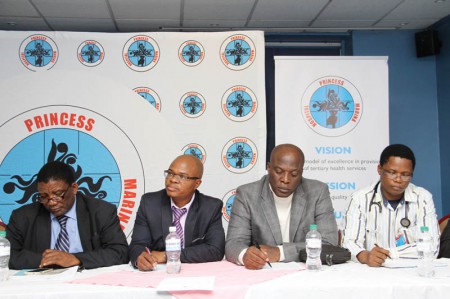A finger on the nation�s pulse
Nnasaretha Kgamanyane | Friday April 17, 2015 16:17


The Diamond Miracle allowed an agrarian economy with a per capita Gross Domestic Product (GDP) of approximately $70 to transform into a modern, comparatively wealthy society of $7,315 per capita GDP.
With greater incomes and access to Western way of life, however, came counter-cultural influences, with changes in diets and lifestyles evident over the years, particularly in the urban areas.
Where income would previously be derived from backbreaking work in the fields, increasingly greater wages were earned from sedentary office work and where diets consisted of what one reaped, fast food chains mushroomed to service the new white-collar workers.
Health experts such as Princess Marina Hospital (PMH) superintendent, Dr Kelebogil Motumise, note that the socio-economic changes have wrought havoc on the incidence and complexity of Non-Communicable Diseases (NCD).
Marina was established in 1966 when the country gained independence, and at the time was the biggest building in Gaborone, which then only constituted a few building blocks. Today, hospital staff is wrestling with a historical rise in NCDs in the country’s most populous urban area. “NCDs such as heart diseases, cancer, hypertensions, diabetes and others are caused by our lifestyles,” Motumise said at a recent briefing this week. “It is very important to encourage people to change the way they eat and live. “Some of the food we eat and the amount of alcohol we consume is not good for our bodies.”
According to Motumise, Botswana’s growth has resulted in lifestyle changes as is evidenced in more people drinking, smoking and eating junk food, while not exercising regularly. However, besides exhorting Batswana to change their lifestyles, the hospital is leading the country’s healthcare sector in the treatment of cardiac conditions. In 2010, Princess Marina witnessed its first open heart surgery, a development that ushered in the promise of cost savings for the local health care sector, which had been anchored on referrals to South Africa.
In 2012, the hospital conducted its first cardiac pacemaker surgery. Prior to this, the hospital only investigated hearts by means of coronary angiography, a test that uses dye and special X-rays to show the insides of coronary arteries.
Performing cardiac surgeries successfully was a major step for the hospital, noted Motumise. In 2009 Marina entered into partnership with Mauritius’ Cardiac Centre, which boasts a highly trained team of cardiologists and specialists.
“This was done because there were no specialists offering such services in Botswana,” Motumise explained. “We now have a local cardiac team comprising of doctors, nurses, allied healthy professionals and support staff. “Some of them have been sent to Mauritius for skills transfer and experience in order to gain competencies.” The local talent pool is, however, still shallow and Marina does not have a cardiac surgeon carrying out heart operations. The Mauritians thus visit quarterly to conduct the surgeries.
